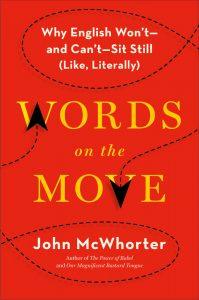Posted by Tom on Wednesday, Nov 30, 2016
One of my favorite radio programs/podcasts is On Point with John Ashbrook. A few weeks ago, Ashbrook had John McWhorter on his show to talk about his latest book, Words on the move: why English won’t – and can’t – sit still (like, literally). McWhorter is a linguist and an English professor and he’s a delight to listen to. He has his own podcast too. The gist of McWhorter’s book is that English, and all languages, change over time and that, all things considered, it’s better that way. Language is best viewed like a story, he argues, and we want a story to go new places. Dictionaries are merely snapshots in time of those stories.

As you may guess from the title, McWhorter makes a case for the frequent use and varied meanings of like and for using literally to mean figuratively. He’s pretty convincing with these, I suppose, but I’ll be curious to see if those two words are still so prominent in ten or twenty years.
Did you know that good used to rhyme with food? So it was like gouda cheese. Makes sense, right? At the supper table last night, my family agreed to say it this way and it was fun. McWhorter describes the process of how vowels shift over time in great detail and it’s fascinating. There was a thing called the Great Vowel Shift in the fifteenth and sixteenth centuries. English, it turns out, used to be much more phonetic than it is now. Spelling corresponded with pronunciation. McWhorter makes a point of stating how vowel shifts are the norm and not unusual, discrete events. Right now, for example, vowels are moving in the Northern Cities Shift region ranging from New York State west through most of Minnesota.
Words are often abbreviated over time. The ly suffix on adverbs, for example, used to be like. Imagine yourself ordering a drink in an Old West saloon, and the like seems more appropriate. About is a word that was mashed together from three – at, by, and out.
You know how Spanish verbs end with ar, er, and ir? Well, Old English verbs used to end with an or on. Over time, the suffix was dropped. Open and listen are two of the few verbs in which a form of the suffix remains.

Some words take on negative connotations over time. Crippled was thought kind and humane at one time. Then we chose handicapped, then disabled, and now differently abled or special needs. This was the case with home relief which became welfare and is now more often cash assistance.
The power of the exclamation point has become diluted. When I’m texting or emailing, I feel like I’m blasting too much energy at the person when I use it. It’s like I’m standing too close and being too loud. It used to be reserved for special emphasis or surprise, but now it just indicates engagement or attention – so says McWhorter. I can't argue with engagement and attention!
Consider Words on the move as a stocking stuffer for your language lover.


Added by Tom